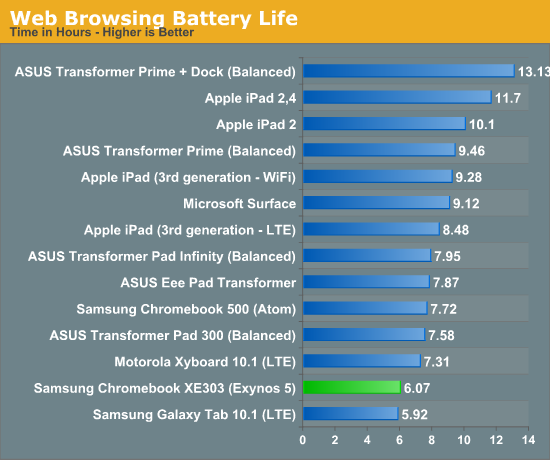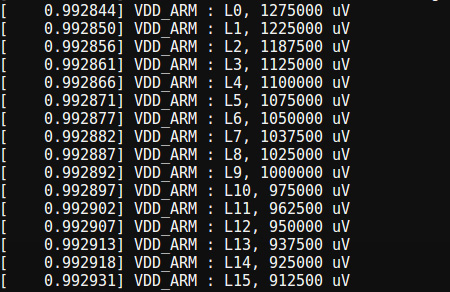Samsung Chromebook (XE303) Review: Testing ARM's Cortex A15
by Anand Lal Shimpi on October 31, 2012 9:00 AM ESTBattery Life & Power Analysis
The final unknown in all of this is power consumption. ARM's Cortex A15 isn't really supposed to be a sipper of power, and when placed in a notebook I don't know that there's a lot we can conclude about how it stacks up to Atom either. Some high level power consumption data would normally help but these two platforms are fairly different:
| Samsung Chromebook Power Consumption Comparison | ||||||
| Display @ 200 nits | Idle | Kraken (Avg) | Kraken (Peak) | |||
| Samsung Chromebook 500 (Atom N570) | 11.53W | 14.4W | 15.2W | |||
| Samsung Chromebook 303 (Exynos 5 Dual) | 6.33W | 10.5W | 11.3W | |||
The new Chromebook consumes considerably less power at idle than its predecessor. The smaller display, simplified motherboard and truly integrated SoC platform are likely all to thank for this. The significant reduction in power also helps explain the big reduction in battery capacity as well.
Under load, the two platforms do see differing levels of additional power consumption. The new Exynos 5 based Chromebook sees a dramatic increase in power consumption under load, hitting 10.5W (a 66% increase over idle) while running Mozilla's Kraken benchmark. The Atom N570 based Chromebook increases power consumption as well, but just not by as significant a degree: ~25%. This actually helps illustrate exactly why Atom wasn't phone worthy in its earlier incarnations. Contrary to popular belief, it wasn't actually peak power consumption that was the problem (a move to 32nm can easily eat into these numbers). The total platform power consumption, particularly at idle, was Atom's real problem in the early days. It also turns out that this is much of what keeps Intel's Core processors from moving into ultra mobile form factors, something that Haswell is supposed to address.
Given that we're dealing with somewhat different panels here, I wanted to see what power consumption looked like if we removed the panels from the equations. I re-ran all of the power data with the display turned off:
| Samsung Chromebook Power Consumption Comparison | ||||||
| Display Off | Idle | Kraken (Avg) | Kraken (Peak) | |||
| Samsung Chromebook 500 (Atom N570) | 8.82W | 11.4W | 12.4W | |||
| Samsung Chromebook 303 (Exynos 5 Dual) | 4.07W | 8.32W | 9.27W | |||
The old Atom based Chromebook uses more than twice the idle power of the new version - it's no wonder Google was able to get away with a battery half the size. Once again however we see a much larger increase in power consumption once the Cortex A15 is under heavy load. Active power consumption more than doubles on the new Chromebook, while we see around a 30% increase on the Atom based system. I do wonder what will have to be done to get the Exynos 5 Dual into a smartphone as an increase of ~4W under load just won't cut it in a phone. The Atom platform shows a 2.6W increase in power under load, which sounds about right for a high clocked 45nm part.

Despite the more power efficient platform, the reduction in battery capacity puts the new Chromebook well below the Atom model in battery life. Our wireless web browsing test put the new Chromebook at just over 6 hours of continuous use on a single charge. For a notebook that's not too bad, but compared to modern tablets it's not good.

The performance gains over Atom (and by extension, the ARM Cortex A9) do give us some indication as to what could be done to get Exynos 5 into a smartphone. By dropping clocks much lower than 1.7GHz Samsung would be able to maintain a performance advantage in a very power constrained device and hopefully keep power in check. The photo above features a list of all of the voltage levels supported by Samsung's Exynos 5 Dual as implemented in the new Chromebook.










149 Comments
View All Comments
eddman - Thursday, November 1, 2012 - link
What your comment has to do with what I wrote?! I never mentioned anything about smartphones.I just pointed out that you cannot compare an old 45nm chip with a brand new 32nm one, consumption wise.
Then again, just because we haven't seen clover trail on smartphones, doesn't mean it consumes too much power.
Hulk - Wednesday, October 31, 2012 - link
Good quality IPS screen on my next laptop or I stay with my Dell 640m forever.Put a SSD in it recently and I'm totally fine with it.
slackpenguin - Wednesday, October 31, 2012 - link
I keep reading these comments on reviews for this device like "wouldn't some other device be a better value for $250?"How many of you actually go and buy $250 used clunker laptops and are overjoyed with the "value" you just picked up over a 2.5 lb, 0.8 inch, fanless laptop with a warranty?
I haven't seen $250 laptops that come with any "advantage" of a "proper OS". New $250 laptops almost always come with Windows 7 Starter. Used, almost always blank or Windows XP Home. They inevitably either weigh 6 lbs or run a dog slow Atom with 1GB RAM and a 4200 or 5400 rpm drive that is soundly beat by this new Exynos chip setup.
Granted, you can upgrade most any of these clumsy $250 devices talked about for another $40 as Microsoft is desperate for you to use tiles instead of a start menu.
It sounds like most of these comments are from people who would see value in the "Homer Car" over one of those Smart cars. There are plenty of devices out there for you people. This "value" comment is just getting annoyingly repetitive.
eddman - Wednesday, October 31, 2012 - link
You are right about the 250$ range, but with a little more you can get some good stuff.http://www.bestbuy.com/site/Asus+-+14%26%2334%3B+L...
http://www.bestbuy.com/site/Asus+-+15.6%26%2334%3B...
TrackSmart - Wednesday, October 31, 2012 - link
Anand,Why not add a few words comparing this to a standard netbook? $250 sounds like a unique price class, until you hop on Newegg and see that netbooks can be had for similar prices. Here's an 11.6" model for $278 that runs an AMD C60 CPU, 4GB RAM, and 320GB HDD: http://www.newegg.com/Product/Product.aspx?Item=N8...
Key questions worth addressing in the article:
1) Is the Chrome user-experience dramatically better than running Windows on a low-end processor? [Particularly the more efficient Windows 8 platform.]
2) Do the advantages of a lightweight operating system really outweigh the lack of versatility compared to a full-blown OS?
3) Many of us have purchased netbooks as replacements of our parents ancient laptops. Does this Chromebook do a better job than netbooks at meeting basic computing needs?
Krysto - Thursday, November 1, 2012 - link
Yes it is, and Windows 8 is not that much more efficient than Windows 7. Maybe 5% more efficient.TrackSmart - Thursday, November 1, 2012 - link
To clarify, this isn't a "yes" or "no" question that I wanted an answer to. The "answer" depends on your computing needs and what you can afford.I have my own general answers. For my purposes, the Chrome OS is too limited for what I want to do with a laptop-like device. The *concept* of a lightweight operating system that can run on low-end hardware is fantastic. However, the Chrome OS ecosystem is still lacking in features and software availability. Microsoft's RT operating system sounds like it is getting closer to this goal, at least if Anandtech's review is to be believed. We'll have to see if 3rd party software appears to round-out the ecosystem. And the price is still $600 if you want the keyboard cover, so out of this sub-$300 discussion.
On the other hand, a Windows-based netbook can run all of the software I need, but painfully slowly. It's the reason I don't own a netbook and chose to spend more than $300. But if $300 is all you have to spend, and you need something portable that runs all of your productivity software, an 11.6" netbook might be better for you than a Chromebook.
karasaj - Wednesday, October 31, 2012 - link
Does anybody notice that A15 pretty much beats the Z2760 from the Surface review hands down in every way?If only Surface RT had that. But then again that might say just as much about IE versus chrome.
alvinchim - Wednesday, October 31, 2012 - link
Anand: How fast does this boot up? Is it like a smartphone/tablet, instantaneous? Is it like an apple ssd/os, pretty quick? Or like a window 7 SSD watch the screens go by? Or like a windows xp/hd x 7 years old, you might as well sort the laundry, text your girlfriend, and brush your teeth boot? That's a big question, because this really is like a tablet with a keyboard and a bad screen.slackpenguin - Wednesday, October 31, 2012 - link
I keep seeing figures of 10 seconds cold boot, 2 seconds from sleep mode, and 3 seconds off.